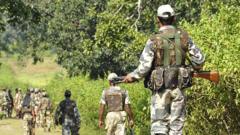In a significant escalation of ongoing conflict, Nambala Keshava Rao, a prominent leader of the Maoist insurgency in India, has been killed during a violent encounter with Indian security forces in Chhattisgarh. Known by the alias Basavaraju, Rao was among 27 rebels confirmed dead during the confrontation, which also resulted in a police officer's death. This marks the first time in 30 years that a Maoist leader of his stature has been killed by government forces, according to statements from Indian Home Minister Amit Shah.
The Maoist insurgents, who have been active for decades and claim to represent neglected populations, have faced a renewed crackdown from the Indian government, which is determined to conclude the insurgency by March 2026. Rao, an engineer turned guerrilla leader, had been on the National Investigation Agency's most wanted list prior to his death.
The gunfight erupted in Narayanpur district after intelligence reports suggested that senior Maoist leaders were present in the area. Following Rao's death, Prime Minister Narendra Modi praised the efforts of security forces on social media, calling their actions a remarkable success. However, the Communist Party of India condemned the killings, demanding an independent investigation into the events.
This confrontation comes as part of the Indian government’s large-scale military operation, known as Black Forest, which has reportedly led to the arrest of 54 rebels and the surrender of 84 others across Chhattisgarh, Telangana, and Maharashtra. The Maoists have stated their willingness to engage in dialogue with the government, provided that military actions cease and troops are withdrawn, but local officials insist that any talks must be unconditional.
The Maoist movement, inspired by the ideas of revolutionary leader Mao Zedong, began in West Bengal in the late 1960s and now extends across a third of India's 600 districts, often referred to as the "red corridor." Despite significant military and police operations pushing them back to forested areas, clashes between security forces and rebels remain frequent and deadly. Last year alone, approximately 287 rebels were killed during these confrontations, primarily in Chhattisgarh, contributing to an estimated total of over 10,000 deaths attributed to the conflict since its inception.




















